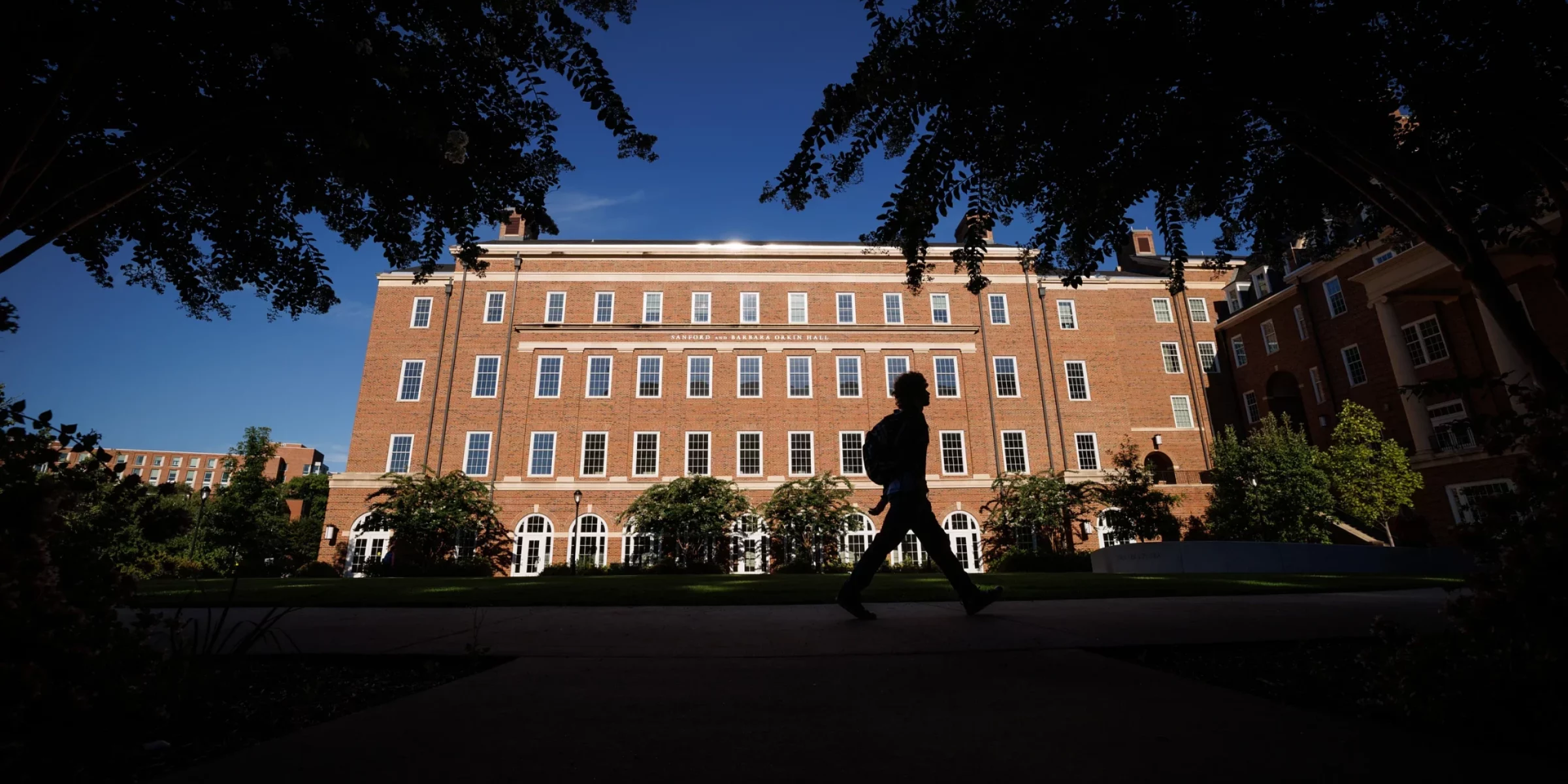Program Overview
The PhD program in Economics provides in-depth, rigorous training in the theory and application of microeconomics, macroeconomics, and econometrics. Entering students aim for research and teaching careers in academia or research-oriented positions in government, consulting, or private industry. Faculty members work closely with PhD students, generating a collaborative, stimulating intellectual environment.
Director of Graduate Studies
- Sara and Dan Boyd Professor and Professor, John Munro Godfrey, Sr. Department of Economics
- Director of Graduate Studies, PhD Program
Preferred Deadline: January 15
Students complete basic coursework during the first two years. In the first year, students take core courses in Microeconomics, Macroeconomics, and Econometrics. The second year is devoted to field courses, and students begin to develop their own research ideas through this coursework. Students’ independent research begins by the summer after the second year when they work on their “second-year” paper, which is typically the first step in building a dissertation. After the second year, students have the opportunity to teach their own class, building additional core knowledge and developing important teaching and pedagogical skills.
After the first year, students participate in our departmental and student seminar series. Many students also choose to participate in brown bag workshops and reading groups. There is ample opportunity to present on-going research both to obtain critical feedback and develop important presentation skills. Students are expected to be proactive and take advantage of these opportunities.
Students are required to complete two fields of specialization. The department offers fields in advanced macroeconomics, health economics, industrial organization, and labor economics. Please visit our faculty directory for additional insight into the research focus within our department.
Program Structure
To earn a PhD a student must:
- Complete a minimum of 54 semester hours of coursework, including required courses in microeconomic and macroeconomic theory, econometrics, and research skills.
- Pass two out of three written comprehensive (core) exams in microeconomic theory, macroeconomic theory, and econometrics in their first summer (at the end of their first year).
- Complete two fields of specialization.
- Complete a second-year paper assignment.
- Form an advisory committee and complete an Advisory Committee Form, which is typically done by the fall of the third year and must be done before the oral examination.
- Complete a Final Program of Study Form, which is typically done by the fall of the third year and must be done before the oral examination.
- Pass the oral examination by the end of the third year. Once a student passes the oral examination and completes the Admission to Candidacy Form, they will be formally admitted into candidacy.
- Regularly present their research in the graduate student workshop.
- Write and defend an acceptable dissertation.
Course Work
Students enrolled in the PhD program in Economics are required to complete a set of core and selected field courses of specialization. The core curriculum consists of the following courses: Mathematical Analysis for Economists (ECON 8000), Microeconomic Theory (ECON 8010 and 8020), Macroeconomic Theory (ECON 8040 and 8050), Statistics for Econometrics (ECON 8070) and Introduction to Econometrics (ECON 8080).
In addition, to satisfy the university’s research skills requirement, students must attend the workshops and seminars sponsored by the department (ECON 8980), and successfully complete Research Methods in Economics (ECON 8090).
Students are required to complete two fields of specialization. The department offers fields in advanced macroeconomics, health economics, industrial organization, and labor economics. Three field sequences are offered per academic year on a set rotation. A field is completed after passing two courses in an area of specialization with a minimum average grade of 3.0.
Written Comprehensive Examinations
At the end of the first year, students are expected to have completed the Microeconomic Theory (ECON 8010 and ECON 8020), Macroeconomic Theory (ECON 8040 and ECON 8050), and Econometrics (ECON 8070and ECON 8080) sequences and to take the Microeconomic Theory, Macroeconomic Theory, and Econometrics core exams. Students must take all three exams and must pass two out of the three exams during the summer after their first year to maintain satisfactory academic progress towards their degrees. The core exams are given in June after the first year, and exam retakes typically occur in July. The exams are assessed on a pass/fail basis.
Research Focus
Students’ development towards becoming independent researchers continues with the second-year paper. By the summer after their second year of coursework, students form a second-year paper committee of three faculty members and propose a topic for their second-year paper. Over the next six months, students work under the supervision of this committee to craft a completed economic research paper. By January of their third year, successful students will have completed a paper having the potential for publication in a scholarly journal.
Progress towards becoming an independent researcher culminates in a student’s dissertation. Students should establish a thesis committee of at least three graduate faculty members by the spring of their third year. The completed dissertation must demonstrate original research, independent thinking, scholarly ability, and technical mastery. Its conclusions must be logical, its literary form acceptable, and its contribution to knowledge should merit publication.
Typical Course Sequence
Year 1
Fall
Spring
Summer
- Microeconomics Theory Comprehensive Exam
- Macroeconomic Theory Comprehensive Exam
- Econometrics Comprehensive Exam
- Microeconomics Theory Comprehensive Exam Retake
- Macroeconomic Theory Comprehensive Exam Retake
- Econometrics Comprehensive Exam Retake
Year 2
Fall
- ECON 8110 Econometrics I
- Part one of three field sequences from among the following areas:
- Advanced Macroeconomics
- Health Economics
- Industrial Organization
- Labor Economics
Spring
June
- Form a second-year paper committee
- Submit a 5-page proposal for the second-year paper to the Director of Graduate Studies, signed by three faculty members who agree to serve on the student’s committee and approve the proposal
Year 3
Fall
Year 4 and Beyond
Placements
Economics PhDs have placed at various prestigious academic institutions.
Placements include tenure-track positions at:
- Baylor University
- Bentley University
- Loyola Marymount University
- University of Arkansas-Little Rock
- University of Maine
Post-doctoral positions include:
- Centers for Disease Control
- Duke University
- National University of Singapore
- Purdue University
- University of North Carolina
- University of Pennsylvania
Our students have also placed at prominent positions in government and industry, such as:
- US Census Bureau
- US Federal Communications Commission
- US Food and Drug Administration
- Abt Associates
- Analysis Group
- Burning Glass Institute
- PwC
- RTI International
Admissions and Financial Aid
Individuals holding a four-year baccalaureate degree in any discipline from an accredited institution with a GPA of 3.0 on a 4.0 scale are eligible to apply. Applicants are required to have college credit in differential calculus. Because of the necessary rigor of the curriculum, we also very strongly recommend taking courses in integral and multivariable calculus and linear algebra prior to applying.
The General Test of the GRE is required for admission into the program. The GMAT will not be accepted as a substitute for the GRE. Applicants who have received degrees from non-U.S. accredited institutions in countries where English is not the primary/official language are required to demonstrate English proficiency by submitting a TOEFL or IELTS score along with their application. Applicants who have received degrees from accredited institutions in the U.S. or from institutions in countries where English is the primary language (e.g., the United Kingdom, Australia, New Zealand) usually are not required to submit the TOEFL (or IELTS) scores. If such an applicant received the degree more than two years prior to application to the Graduate School and has been residing/working in a country where the primary language is not English, he or she must submit current scores. Students who are currently enrolled and have been enrolled at least one year at a regionally accredited U.S. institution, may have the English language proficiency requirement waived, if their work shows a strong quality of performance (e.g., cumulative GPA of at least 3.0). Review the Graduate School’s details on English Language Proficiency requirements and country-specific requirements.
All applicants to the PhD program are automatically considered for financial assistance. The Terry College of Business offers a variety of teaching and research assistantships, scholarships and fellowships. Qualified incoming graduate students are typically offered 9-month (academic-year) teaching or research assistantships from the college, as recommended by the department. The department provides these assistantships to continuing PhD students for five years of study. All assistantships carry a tuition waiver and a stipend.
Application Process
The application process is spelled out in detail on the Terry College’s application process and materials page. All application forms and instructions for completing them are available there.
To ensure that your application receives full consideration for funding, apply no later than January 15. Please note that the application must be complete, with all components of the application received by the Graduate School by the deadline. Department and Terry College financial-aid decisions are typically made in late February or early March. The UGA Graduate School only accepts electronic letters of recommendation, which can be submitted through its homepage.
PhD students are admitted for the fall semester only; there are no spring or summer admissions. In addition, the department does not transfer degree credit from other graduate programs. Students already holding a Master’s degree from another program are usually asked to take all core and field courses in residence at Terry. Under certain circumstances, the mathematics and statistics preparatory classes may be waived on a case-by-case basis.
Tuition
Please see the Bursars’s Office for information about tuition and fees.
Financial Aid
All applicants to the PhD program are automatically considered for financial assistance. The Terry College of Business offers a variety of teaching and research assistantships, scholarships, and fellowships. Qualified incoming graduate students typically receive 9-month (academic-year) teaching or research assistantships from the college, as recommended by the department. The department provides these assistantships to continuing PhD students for five years of study. All assistantships carry a tuition waiver. Teaching and research assistants are expected to devote approximately 16 hours per week toward their assistantship duties, which are determined by the faculty member or members to whom the student is assigned. Renewal of funding is contingent on making satisfactory progress through the PhD program.


